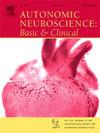Long term effects of parity on maternal autonomic function
IF 3.3
4区 医学
Q2 NEUROSCIENCES
引用次数: 0
Abstract
The mechanisms by which parity and gravidity, number of pregnancies reaching twenty weeks gestational age and total number of pregnancies, respectively, contribute to cardiovascular disease risk remains unknown. Autonomic function was assessed in 65 parous women 1–5 years after normotensive pregnancy, quantified by spontaneous cardiovagal baroreflex sensitivity (BRS) and beat-to-beat blood pressure variability (BPV). Gravidity was negatively associated with BRS independent of age and body mass index (β = −2.01, P = 0.003). A similar trend was observed with greater parity (β = −1.74, P = 0.06). Gravidity and parity were not associated with BPV. These findings suggest a persistent and cumulative adverse effect of pregnancy on cardiac autonomic function in women.
胎次对产妇自主神经功能的长期影响
胎次和妊娠、达到20周孕龄的怀孕次数和怀孕总数分别导致心血管疾病风险的机制尚不清楚。通过自发性心血管压力反射敏感性(BRS)和搏动间血压变异性(BPV)对65例正常妊娠后1-5年的产妇的自主神经功能进行了评估。体重与BRS呈负相关,与年龄和体重指数无关(β = - 2.01, P = 0.003)。在更大的宇称中观察到类似的趋势(β = - 1.74, P = 0.06)。重力和胎次与BPV无关。这些发现表明妊娠对妇女心脏自主神经功能有持续和累积的不良影响。
本文章由计算机程序翻译,如有差异,请以英文原文为准。
求助全文
约1分钟内获得全文
求助全文
来源期刊
CiteScore
5.80
自引率
7.40%
发文量
83
审稿时长
66 days
期刊介绍:
This is an international journal with broad coverage of all aspects of the autonomic nervous system in man and animals. The main areas of interest include the innervation of blood vessels and viscera, autonomic ganglia, efferent and afferent autonomic pathways, and autonomic nuclei and pathways in the central nervous system.
The Editors will consider papers that deal with any aspect of the autonomic nervous system, including structure, physiology, pharmacology, biochemistry, development, evolution, ageing, behavioural aspects, integrative role and influence on emotional and physical states of the body. Interdisciplinary studies will be encouraged. Studies dealing with human pathology will be also welcome.

 求助内容:
求助内容: 应助结果提醒方式:
应助结果提醒方式:


